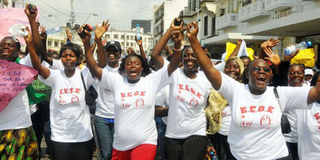Breaking News: KDF chopper crash kills five in West Pokot
How to overcome challenges that exist in the country’s basic education sector

Early Childhood Development Education (ECDE) teachers protest in Mombasa demanding better working conditions in 2011. PHOTO | GIDEON MAUNDU | NATION MEDIA GROUP
What you need to know:
Parents must not spend 100 per cent of their time chasing money and throwing it at their children and their teachers.
I hope that the curriculum for ECDE can be concretised this year to provide a basis for proper training and deployment of ECDE teachers.
Devolve school infrastructure development to the counties.
The year 2016 has begun as many others before it, with public debates on matters education.
This is good — it indicates that the Kenyan public is interested in this sector on which lives and livelihoods depend.
In the past year, I had the privilege to get immersed deeper in the discourse on education in this country, gaining valuable insights into the challenges it faces and the opportunities that we could tap into to circumvent them.
It is from this background that I share my thoughts and prayers for the basic education sector in Kenya in 2016.
PARENTING
First, education begins at home. Parents should take their role as the primary educators seriously and teach children soft skills and values from early ages.
They shouldn’t abdicate this role and expect that by some miracle, their children will grow up to espouse the right values.
A parent is not a sponsor. Parents must therefore not spend 100 per cent of their time chasing money and throwing it at their children and their teachers.
This doesn’t mean, however, that they should fail to provide the requisite materials for their children.
Secondly, in 2016, all the policy issues facing early childhood development education (ECDE) should be resolved. The courts should resolve this dispute.
I hope Teachers Service Commission (TSC) is allowed to assume the role so as to integrate ECDE into the basic education system and standardise its provision.
I hope too that the curriculum for ECDE can be concretised to provide a basis for proper training and deployment of ECDE teachers.
CURRICULUM REFORMS
Thirdly, this is the year in which we should complete the long-overdue curriculum reforms.
We are less than 2 years away from the next General Election. This process should run its cause without undue political interference so that the end product is both bold and practicable.
The process must not conclude with half-hearted measures that leave our children with the heavy loads of books on their backs, running to school before sunrise.
Neither should it leave them with loads of school work to do at home, christened “homework”.
Still on the curriculum, I hope that we create one which guarantees learning in all its forms.
It is my firm belief that there must always be a difference between a schooled and non-schooled person.
Education is costly. It must of necessity, leave a mark in the beneficiary.
Fourth, I pray that this year, our legislators act in the interest of education.
Two things I demand from them: One, devolve school infrastructure development to the counties.
It is easier for a parent in Mwira village where I come from to travel to Kakamega and demand a classroom or petition his/her MCA than chase the national government for the same.
Two, they should help the Cabinet Secretary for Education to reign in the chaos in the management of public schools by reinstating the guidelines gazetted last year by his predecessor.
PERFORMANCE MANAGEMENT
Fifth, in line with reviewing school management, I pray that only school heads sign performance contracts and that performance is broadened to include accountability for school funds, improvement of the learning environment, staff management, among other indicators.
Mean score must not be a key component of the index as this would divert focus away from learning to assessment and motivate cheating in examinations.
If all teachers sign the contracts, their evaluation will drain energy from TSC that would otherwise be channelled to valuable quality assurance activities.
Sixth. In view of the threat that cheating in national examinations poses, not just to the education sector, but to the entire nation, the ministry should institute a comprehensive review of Kenya National Examination Council processes.
It is imperative to review the entire system of setting, handling, printing, storage, transportation and administration of examinations and make appropriate changes (of procedure and personnel where necessary) urgently.
Finally, I look forward to a year in which TSC will engage with teachers in good faith to avert incessant, disruptive industrial actions.
Dr Manyasa is the country manager, Uwezo Kenya, at Twaweza East Africa





